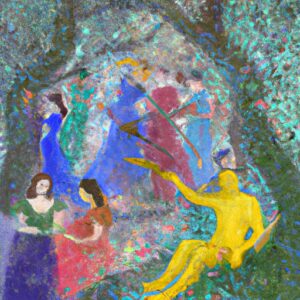What is the past conditional in Italian?
You might be wondering what on earth the conditional is. Have a look at the sentences below to understand better. Focus on the highlighted parts:
- I would like some coffee, please.
- She told me she would have come.
- I would have finished everything if I had had more time.
The sentences you just read are in the conditional. More precisely, the first sentence is in the present conditional and the second and third in the past conditional.
To put it simply, the Italian conditional is the equivalent of the English construction with would, should, and could + verb.
In other words, it’s what in English corresponds to would have gone, would have done, would have been, would have eaten, and would have walked, etc.
We can replace would with could and should. Let’s look at the translation of the sentences we just saw:
- Vorrei un caffè, per favore.
- Mi ha detto che sarebbe venuta.
- Avrei finito tutto se avessi avuto più tempo.
Like in English, the second and third sentences are in the past conditional.
When to use the past conditional?
We use the Italian conditional tense in the following situations:
- To express regret:
Non avrei dovuto ascoltarlo.
I shouldn’t have listened to him.
- To talk about what was supposed to have happened in the past:
Mi hanno detto che avrei dovuto aspettare.
They said I should have waited.
- To say what would have happened if the conditions had been different:
Se fossi andata prima, avresti trovato il negozio aperto.
If you had gone earlier, you would’ve found the shop open.
How to structure the past conditional?
The structure of the Italian past conditional is the following: present conditional of avere or essere+ past participle of the main verb. Let’s look at some examples:
- avrei mangiato
- avrebbe voluto
- saremmo andati
- sarei venuta
Avere and essere are auxiliary verbs which means we use them just to form a tense, but they don’t really carry a meaning. And the main verb is the one that comes after avere and essere.
You’ll see below that we’ve prepared some examples, but for practical reasons, they’re incomplete. Otherwise, they would be too long and we just need to focus on one part of the sentence.
The past conditional with the verb avere
We use the verb avere with most verbs.
When we use avere, the past participle does not change. We only use the form ending in -o, regardless of the grammatical gender and number of the subject, as in the sentences below:
Laura avrebbe mangiato tutto se…
Laura would have eaten everything if…
Loro avrebbero finito l’esame se…
They would have finished the exam if…
The past conditional with the verb essere
We use the verb essere with:
- movement verbs like andare (to go), venire (to come), salire (to go up), scendere (to go down).
- reflexive verbs like svegliarsi (to wake up), lavarsi (to wash oneself), etc.
When we use essere, the past participle changes form according to the grammatical number and gender of the subject, as you can see below:
- -o masculine, singular
Marco sarebbe uscito se…
Marco would have gone out if…
- -a feminine, singular
Giulia sarebbe andata a casa se…
Giulia would have gone home if….
- -i masculine, plural
Pietro e Luigi sarebbero venuti a trovarmi se…
Pietro and Luigi would have come to visit me if…
- -e feminine, plural
Marta e Francesca sarebbero scese in paese se…
Marta and Francesca would have gone down to the town if…
How is the conjugation of the past conditional?
Here are the conjugations of the present conditional of avere and essere. Remember we’ll need them to build the past conditional:
| Avere (to have) | Essere (to be) | |
| Io | avrei | sarei |
| Tu | avresti | saresti |
| Lui/lei | avrebbe | sarebbe |
| Noi | avremmo | saremmo |
| Voi | avreste | sareste |
| Loro | avrebbero | sarebbero |
Let’s now focus on past participles (like walked, played, eaten, gone, in English).
The past participle of regular verbs is conjugated as follows:
- verbs ending in –are take –ato to form their past participle (example: the past participle of mangiare is mangiato)
- verbs ending in –ere take –uto to form their past participle (example: the past participle of cadere is caduto)
- verbs ending in –ire take –ito to form their past participle (example: the past participle of capire is capito)
There are some verbs with an irregular past participle. Here is a list of the most common ones:
| Infinitive | Irregular Past Participle | |
| essere | to be | stato |
| fare | to do or make | fatto |
| dire | to say | detto |
| chiedere | to ask | chiesto |
| accendere | to turn on | acceso |
| spegnere | to turn off | spento |
| leggere | to read | letto |
| rispondere | to answer | risposto |
| rompere | to break | rotto |
| scrivere | to write | scritto |
| vincere | to win | vinto |
| perdere | to lose | perso |
| scegliere | to choose | scelto |
| mettere | to put | messo |
| morire | to die | morto |
| vivere | to live | vissuto |
| ridere | to laugh | riso |
| scendere | to go gown | sceso |
How is the past conditional with volere, potere, and dovere?
Volere, potere, anddovere are special verbs because they are usually followed by a verb in the infinitive (the base form such as mangiare, dormire, etc.).
In this very specific case, we’ll see three verbs together like in the examples below:
Avrei voluto comprare un cellulare nuovo.
I would have liked to buy a new phone.
Laura sarebbe potuta andare al mare.
Laura could have gone to the beach.
Non sarei dovuto venire.
I shouldn’t have come.
If you’re not sure whether to use essere or avere, here’s the rule: volere, potere, anddovereadopt the auxiliary of the verb they are helping.
So, if we want to say they should have listened, we say avrebbero dovuto ascoltare, since ascoltare needs the verb avere (because it’s not a movement or reflexive verb).
Practice with Quizlet
Here's a set of flashcards and quizzes to practice this grammar topic.The past conditional: examples
Now that you know all the rules, let’s have a look at some more examples:
Avremmo dovuto vendere la macchina.
We should have sold the car.
Avrei voluto mangiare tutto.
I would’ve liked to eat everything.
Credevo che il mio regalo ti sarebbe piaciuto.
I thought that you would have liked my present.
Ci hanno promesso che sarebbero venuti a trovarci.
They promised that they would have come to see us.
Sarei andata a scuola se non fossi stata malata.
I would have gone to school if I had not been sick.
Avrei portato il vino se avessi saputo che non c’era.
I would have brought wine if I had known there would be/was none.
Se la mamma avesse fatto le frittelle, le avrei mangiate tutte.
If mom had made fritters, I would have eaten them all.









